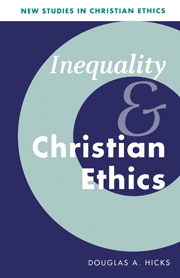Book contents
- Frontmatter
- Contents
- List of figures and tables
- Acknowledgment
- General editor' preface
- Preface
- List of abbreviations
- PART ONE CONTEXTUALIZING INEQUALITY
- PART TWO CONSTRUCTING A CHRISTIAN ETHICAL APPROACH
- 5 Christian ethics and theology in a pluralistic society
- 6 Equality before God in the thought of H. Richard Niebuhr
- 7 Equality before God in the thought of Gustavo Gutiérrez
- 8 Solidarity selfhood, and social goods
- PART THREE TRANSFORMING DISCOURSE, PERSONS, AND SOCIETIES
- Appendix A The Gini coefficient, inequality, and value-claims
- Appendix B Constructing Gini coefficients in income, education, and health/longevity
- Appendix C The construction of the HDI and the IAHDI
- Bibliography
- Index
7 - Equality before God in the thought of Gustavo Gutiérrez
Published online by Cambridge University Press: 05 June 2012
- Frontmatter
- Contents
- List of figures and tables
- Acknowledgment
- General editor' preface
- Preface
- List of abbreviations
- PART ONE CONTEXTUALIZING INEQUALITY
- PART TWO CONSTRUCTING A CHRISTIAN ETHICAL APPROACH
- 5 Christian ethics and theology in a pluralistic society
- 6 Equality before God in the thought of H. Richard Niebuhr
- 7 Equality before God in the thought of Gustavo Gutiérrez
- 8 Solidarity selfhood, and social goods
- PART THREE TRANSFORMING DISCOURSE, PERSONS, AND SOCIETIES
- Appendix A The Gini coefficient, inequality, and value-claims
- Appendix B Constructing Gini coefficients in income, education, and health/longevity
- Appendix C The construction of the HDI and the IAHDI
- Bibliography
- Index
Summary
LIBERATION THEOLOGY AS THEOLOGY
At its root, liberation theology is a method of making sense of people's experiences in the contemporary world in light of a belief in a loving, powerful, gracious being called God. Theology is a “critical reflection on praxis,” entailing the evaluation of a reality that includes a God of life and a world of vast disparities of cultural experience and socioeconomic condition. This requires the employment of various tools and resources, but all in the service of the theological task. It also requires the prioritizing of theodicy: “God-talk and the suffering of the innocent.”
Theology, for Gustavo Gutiérrez, is distinct from the modern, “progressive” theological quest, which most fundamentally engages the question of the existence or non-existence of God in the contemporary world: “How can one proclaim God in a world become adult, a world grown up, a world come of age?” The interlocutor of such modern theology is the “non-believer.” In contrast, Gutiérrez states that the interlocutor of the theology of liberation is the “nonperson,” the human being who is not considered human by the present social order – the exploited classes, marginalized ethnic groups, and despised cultures. Our question is how to tell the nonperson, the nonhuman, that God is love, and that this love makes us all brothers and sisters.
In order for a theology to be liberative, it must take into account the situations of these marginalized and oppressed people.
- Type
- Chapter
- Information
- Inequality and Christian Ethics , pp. 140 - 166Publisher: Cambridge University PressPrint publication year: 2000

